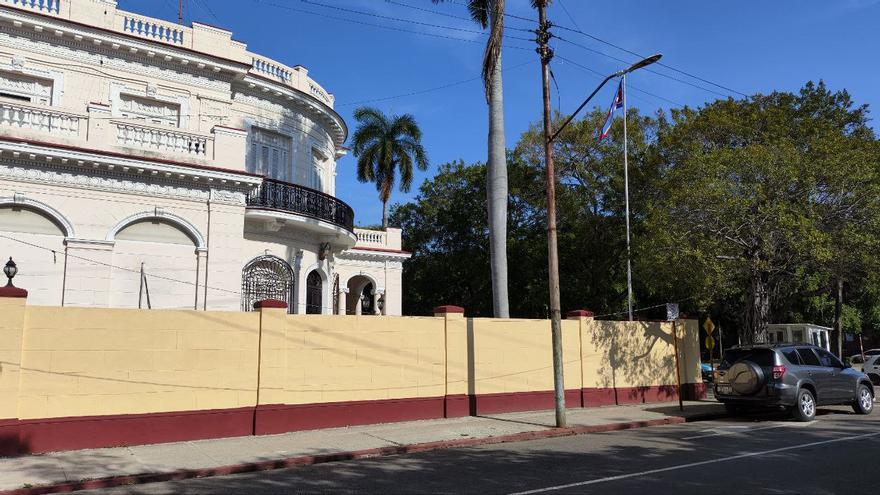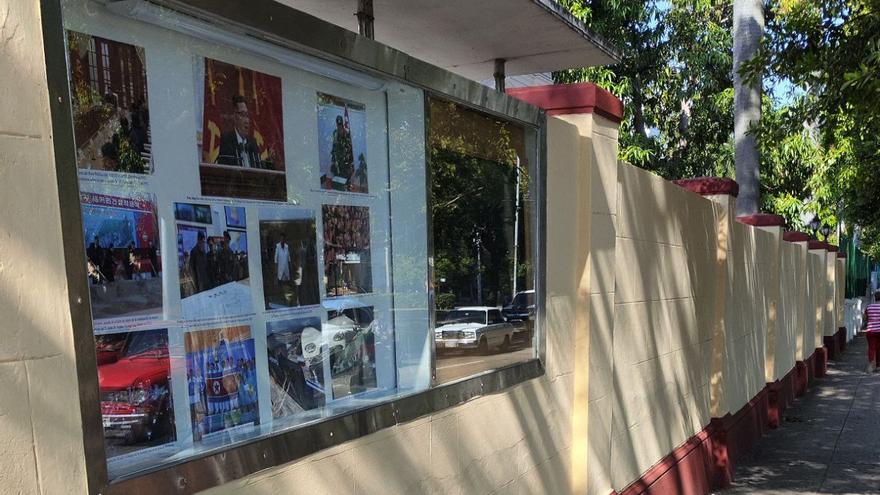
![]() 14ymedio, Havana, February 16, 2024 — The presidential office of South Korea described on Thursday the restoration of its diplomatic relations with Cuba as “a significant political and psychological coup” that will “inevitably” affect communist North Korea, according to the AP agency. Under lock and key this Friday, with several posters of “esteemed comrade” Kim Jong-un on its fence, the North Korean Embassy in Havana seems to agree.
14ymedio, Havana, February 16, 2024 — The presidential office of South Korea described on Thursday the restoration of its diplomatic relations with Cuba as “a significant political and psychological coup” that will “inevitably” affect communist North Korea, according to the AP agency. Under lock and key this Friday, with several posters of “esteemed comrade” Kim Jong-un on its fence, the North Korean Embassy in Havana seems to agree.
This same Friday, on the occasion of the 82nd anniversary of the birth of Kim Jong-il, President Miguel Díaz-Canel sent, via X, an “affectionate greeting to the Party, Government and noble people of the DPRK.” And he added: “We reaffirm our historic relationship of friendship, solidarity and brotherhood.”
Meanwhile, neither the North Korean Foreign Ministry, which had just received the credentials of a new Cuban ambassador in Pyongyang, nor its Government have yet broken the silence about the rapprochement of its rival to one of its few allies since the time of the Cold War. The Associated Press agency (AP) says that a “high-level official of the South Korean presidency” explained to the press that the rapprochement will affect the traditional “brotherly ties” of Pyongyang with the Island.
The opening of diplomatic ties (with Cuba) is the culmination of our efforts to expand our diplomacy to nations that have been part of the socialist bloc
The official – who spoke on condition of anonymity – reported that President Yoon Suk Yeol “has worked actively to establish relations with Cuba, but Cuba had reservations at first due to its ties with North Korea.” The United States, he explained, was informed by Seoul “in advance” of the approach.
“The opening of diplomatic ties (with Cuba) is the culmination of our efforts to expand our diplomacy to nations that have been part of the socialist bloc, including countries that have been friendly with North Korea. It clearly shows where the mainstream is in the flow of history, and also who participates in that mainstream,” the official added.
On Wednesday, Seoul restored its diplomatic relations with Havana, broken since Fidel Castro came to power in 1959. A brief statement from the Cuban Foreign Ministry announced the “exchange of diplomatic notes” of both nations before the United Nations, in New York.
“The establishment of official relations between the two countries was carried out in accordance with the purposes and principles of the Charter of the United Nations, International Law and in accordance with the spirit and standards established in the Vienna Convention for Diplomatic Relations of April 18, 1961,” said the Ministry of Foreign Affairs.

The world press has described the event as a “historic step” between the two countries. BBC reported that Havana and Seoul had only enjoyed ten years of diplomatic relations, since 1949. The “communist bastion” that the Island became since Castro’s arrival made the country an ideal ally for North Korea.
BBC interviewed a South Korean diplomat who, under condition of anonymity, revealed that Havana was pressured by the North Korean Government, which tried to slow down the rapprochement, as well as by “high Cuban leaders of the old guard,” who do not welcome the reconnection.
“Cuba has a very great symbolic importance for North Korea because it is its base of operations in America, and that is why it has always pressured the Cuban government to stay away from Seoul,” he added. “It is a geographically strategic country, attached to the United States, and positioning ourselves there is important in the long term.”
“It seems that there was some kind of commitment dating from the time of Fidel Castro and Kim Il-sung not to take that step,” a former Cuban official told the BBC, who did not identify himself.
It seems that there was some kind of commitment that dated back to the time of Fidel Castro and Kim Il-sung not to take that step
The North Korean Embassy in Havana, according to the British media, is the nerve center of North Korean diplomacy and espionage in the region, in addition to being the largest in the Americas. However, trade and economic relations between the two countries are “practically non-existent,” unlike what happens between Seoul and Havana.
In 2022, for example, according to data provided by the Ministry of Foreign Affairs of South Korea, the country exported goods to Cuba for a value of 14 million dollars and imported goods for seven million. In addition, the “daily life of the Island,” explains BBC, is full of Korean equipment such as Samsung and LG phones, and Hyundai and Kia brand cars.
There was a South Korean stand at the Havana International Fair and Kotra, the state trade body, has served as an embassy on the Island, especially for economic exchanges. Also, among young Cubans, there are thousands of fans of Korean culture, who listen to their music and watch their soap operas. According to the BBC, the Korean fan club in the country exceeds 10,000 members.
Sangmi Han, a journalist with the Korean Service of the BBC, also offered his diagnosis: “The fact that Cuba, North Korea’s sister country, has established diplomatic relations with South Korea in extreme secret without Pyongyang knowing will be a huge wound, difficult for North Koreans to accept.”
On the Island, there is confusion about the change in the Chancellery’s roadmap. In the announcement, published in Cubadebate, dozens of readers gave their opinion on the approach. The stupor is summed up in a question: “North or South?”
Translated by Regina Anavy
____________
COLLABORATE WITH OUR WORK: The 14ymedio team is committed to practicing serious journalism that reflects Cuba’s reality in all its depth. Thank you for joining us on this long journey. We invite you to continue supporting us by becoming a member of 14ymedio now. Together we can continue transforming journalism in Cuba.
